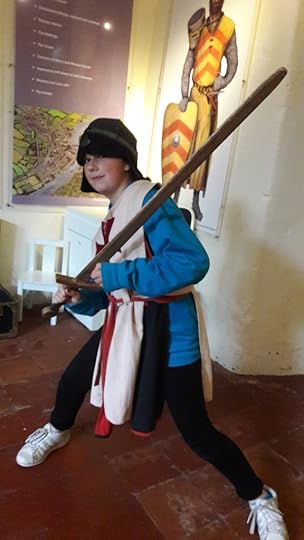The History of Havoc
Hello,
I should perhaps have known the word havoc had military links thanks to the immortal line by Marc Antony in Shakespeare’s “Julius Caesar” – ‘Cry “Havoc!” and let slip the dogs of war.‘
Marc Antony was alone with the murdered body of Julius and was imagining how angry his friend would be to return as a spirit seeking vengeance on his assassins but what was this havoc he was talking about?
In this case the second half of the line gives us a clue – the dogs of war was a reference to trained soldiers ready to engage in battle as soon as they are unleashed.
 My Knight is ready to Cry Havoc!
My Knight is ready to Cry Havoc!Havoc has been part of the English language since the early 1400s when to cry havoc was to give the signal to pillage. It was borrowed from French crier havok in the late 1300s and originated there in Old French havot (pillage, loot). Havot is related to haver (to seize or grasp) and either comes from a Germanic source or possibly the Latin verb habere (to have).
The idea of havoc being devastation (presumably in the aftermath of the pillaging) arose in the late 1400s. I would use havoc to describe the craziness and mess which often accompanies a child’s birthday party or a vigorous play-date – devastation of a milder sort than the original military sense.
The spelling of havoc has evolved, as you can see, and the reference book where I found its pillaging origins had it as havock. They also believed it wasn’t all about pillaging but was an order to massacre without giving quarter (mercy). The order was outlawed during the reign of King Richard II of England, on pain of death.
Until next time, happy reading, writing, and wordfooling,
Grace
p.s. Loyal Wordfoolery readers will be glad to hear that I finished fixing the proof of the paperback edition of “Words Christmas Gave Us” last week and I hope to send it out for cover design shortly. This book has been delayed twice due to my mother’s ongoing ill health. No promises on a release date, but I’m still working on it when time permits and you will be the first to hear.



